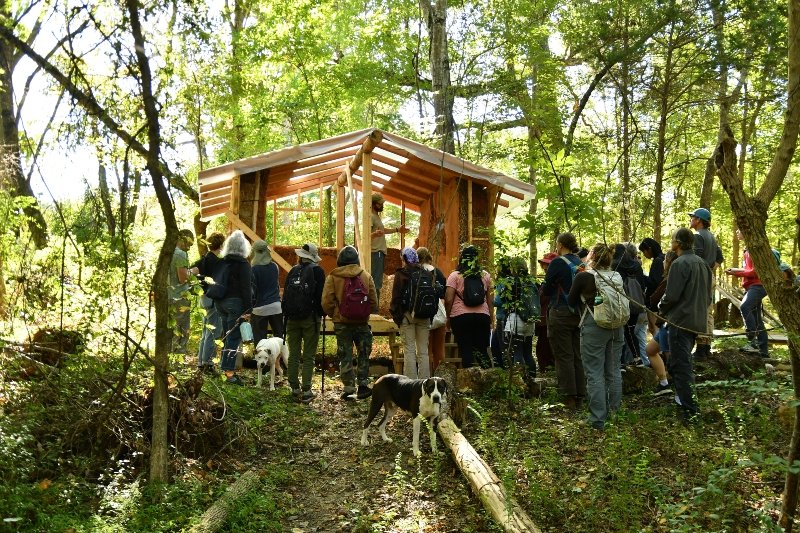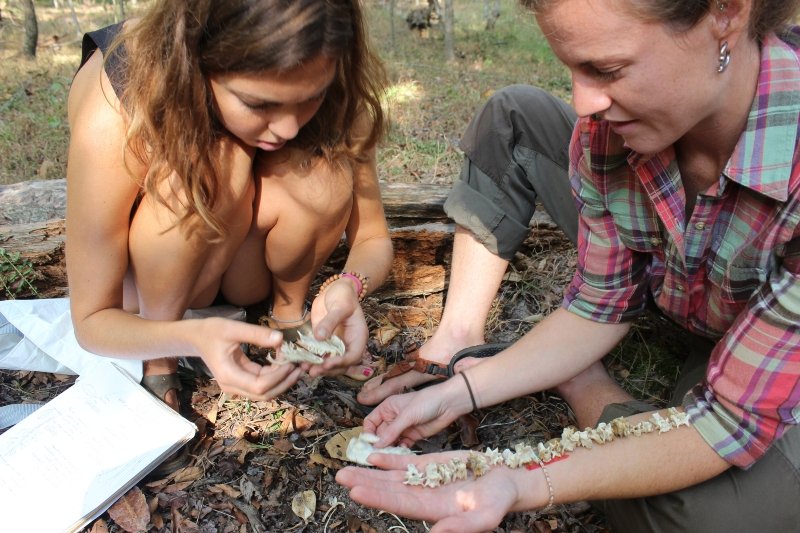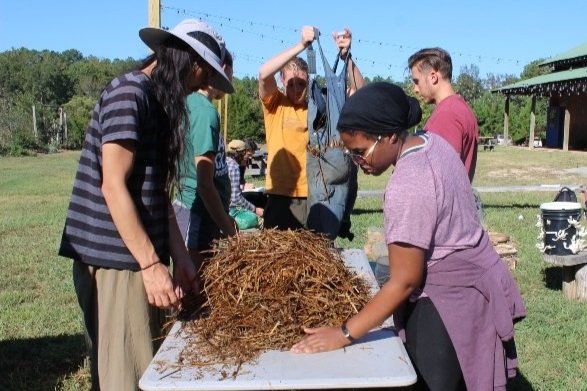Abbey Cmiel
Written by: Abbey Cmiel, Rising Earth Immersion Participant, Fall 2019.
As young adults, we seek new models by which to live, educate, and learn. One place we must look is to our eldest relatives living in successful community: the forests. Over the past two years of living and apprenticing at three permaculture education centers—the Eco-Institute in North Carolina, the Occidental Arts and Ecology Center in California, and now Rancho Mastatal in Costa Rica—I have felt the transformative effect of being brought up in community. Much like the interconnected symphonies of trees, fungi, plants, animals, bacteria, and insects in a forest, Earth-based education has allowed me to learn and grow in a system radically different from the dominant Western culture of extraction and independence.
I was raised not in a true forest, but in the monoculture of identical, straight-trunked trees bred for production. Prior to the internships of the past two years, my entire educational career preached the myth of individual achievement. Year after year, I was encouraged to take higher level classes, run organizations, and compete with classmates to get into a “good college” and eventually get a “good job”. I presumed that making it to the “top” of this system meant happiness and fulfillment, but by senior year of college, I felt deeply anxious, lonely and uncertain for the future. My classes on environmental and global studies spoke of the troubling times for our global economic, health, and climate systems, and my involvement in the campus center for social justice revealed the heartbreaking depths of racism and violence against vulnerable communities in US society.
laughter and peace…come from the simplest of tasks in community: spreading mulch, pulling out tomato vines, or struggling to build a greenhouse.
Serendipitously, a professor brought my class to the nearby Eco-Institute in Chapel Hill, NC, for a potluck. We sang a gratitude song before the meal, thanking the Earth and each of the meals’ contributors for their acts of generosity. It felt like a homecoming. I started attending the bi-weekly garden volunteer days, buoyed by the laughter and peace that come from the simplest of tasks in community: spreading mulch, pulling out tomato vines, or struggling to build a greenhouse. I showed up to the story nights, fire circles, and potlucks, reveling in this way of being so dramatically different and more fulfilling from what I had known before.
As graduation loomed on the horizon, I felt increasingly torn between my worlds of self-promoting achievement and Earth-based community. Luckily, I received an email from the Eco-Institute for their Rising Earth Immersion, a 10-week permaculture intensive program and experience in community living. After countless back-and-forth phone calls, filled with hesitation and uncertainty, I packed a backpack with gardening gloves and a few changes of clothes to move into a yurt.
On the first day, 11 other young adults (aged 18-30) and I nervously unpacked our bags and got to know one another over a Cob-oven pizza party. Though we came from across the country and extremely different backgrounds, it seemed we all had something in common: a yearning for the purpose that comes from living in community with one another and deep connection to the Earth.
Over the ten weeks, we fell in step: cooking, feeding chickens, tending the garden, and getting kicked in the face by the equally quarrelsome and cute goats we milked each morning. We were guided by brilliant instructors on nonviolent communication, spiritual ecology, permaculture, and embodied movement. We held women’s circles, attended protests, participated in a vision quest, taught community skill shares, identified flora and fauna, and hosted open mic nights. We dove deep into community, meeting with our elder mentors (a group of people 60+) from around the area, holding weekly potlucks, and showing up for one another when we experienced injury, sickness, or loss of a loved one. We each grew into the niches that fed our souls and honored our diverse skills.
As scientific research is making increasingly clear, old growth forests operate almost like a single organism: sharing resources, maintaining equilibrium, and cycling nutrients. These forests honor their elders, bring up new life, exhibit cooperation, encourage diversity, and value the collective. As I studied the forest, it became increasingly clear how our human community mirrored its dynamic energy flows.
Of course, community, like the forest, is not without its many challenges. I learned the complete overwhelm of trying to cook for a group of 20 and the immense frustration of collective decision making. Due to a life of conditioning on the importance of individualism, the constant connection felt agitating at first. But each time I took an hour or two away from the group, I felt the pull back in, and with time, I saw myself change.
“I feel the collective harm created and felt by humanity, but also our collective potential for wellbeing.”
With deeper interconnection, I feel everything more deeply—the anguish of systems and of racism and inequality. The overwhelming anger at exploitation and extraction of people and the Earth. The sadness for those harmed in body and mind by Covid. The frustration at our failing political and economic systems. As my roots and branches become more intertwined with those around me, I feel the collective harm created and felt by humanity, but also our collective potential for wellbeing.
As I learn more hands-on skills and feel increasingly capable of living in connection with Earth’s systems, I see our potential to reconnect to the great web of life. By eliminating the current systems of wastefulness, isolation, exploitation, and segregation, we can become the generative keystone species humans have the potential to be. We must make opportunities to live in Earth-centered ways available to all people, not just the privileged and wealthy few. We must learn from native ways of being, integrate our elders, defend the marginalized, and cycle abundance. We must give more than we take, offer our unique skills, and value our diversity. We must live like the forest, seeing ourselves as a connected unit while valuing our individual skills and passions. Our collective survival—and joy!—depend on it.









